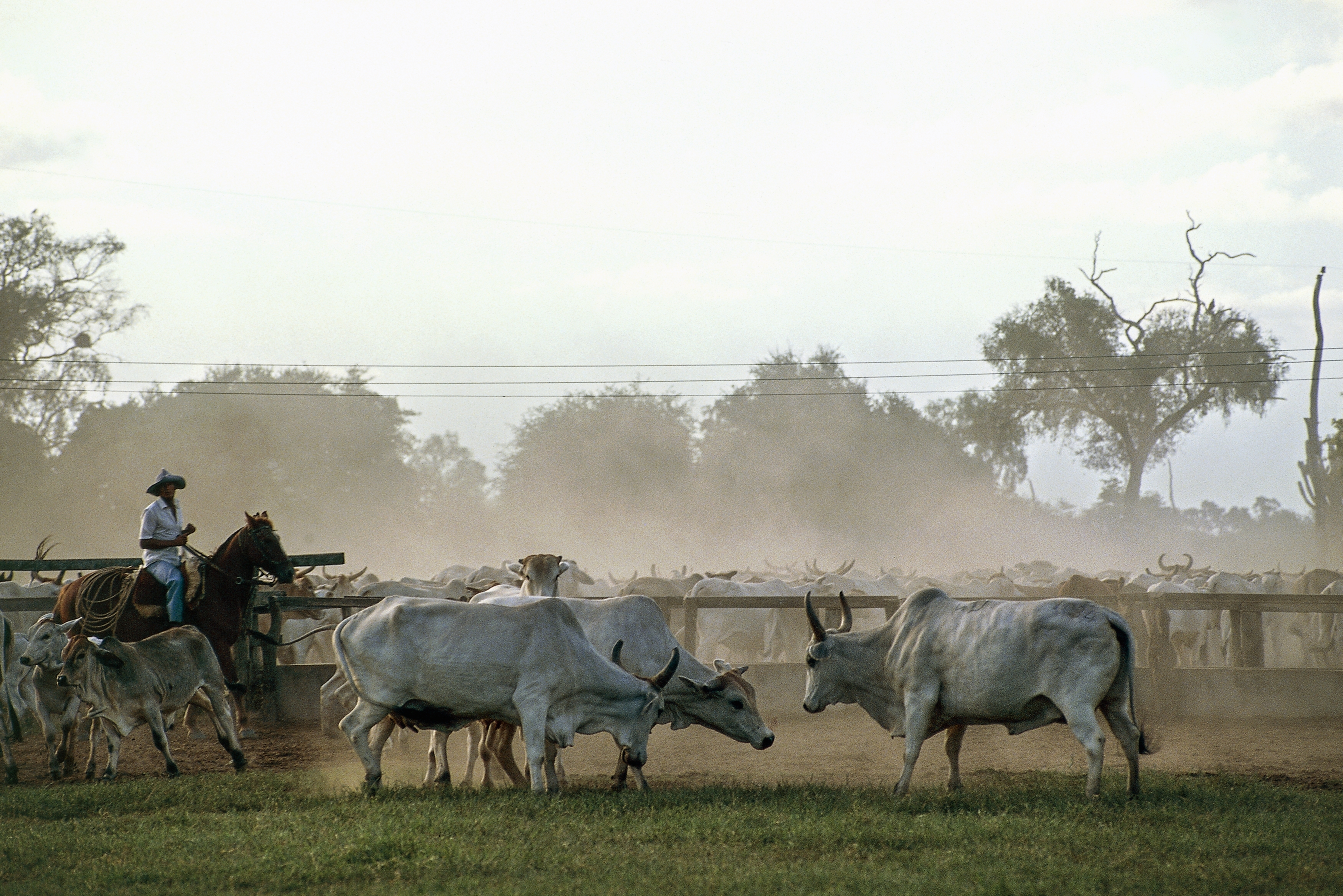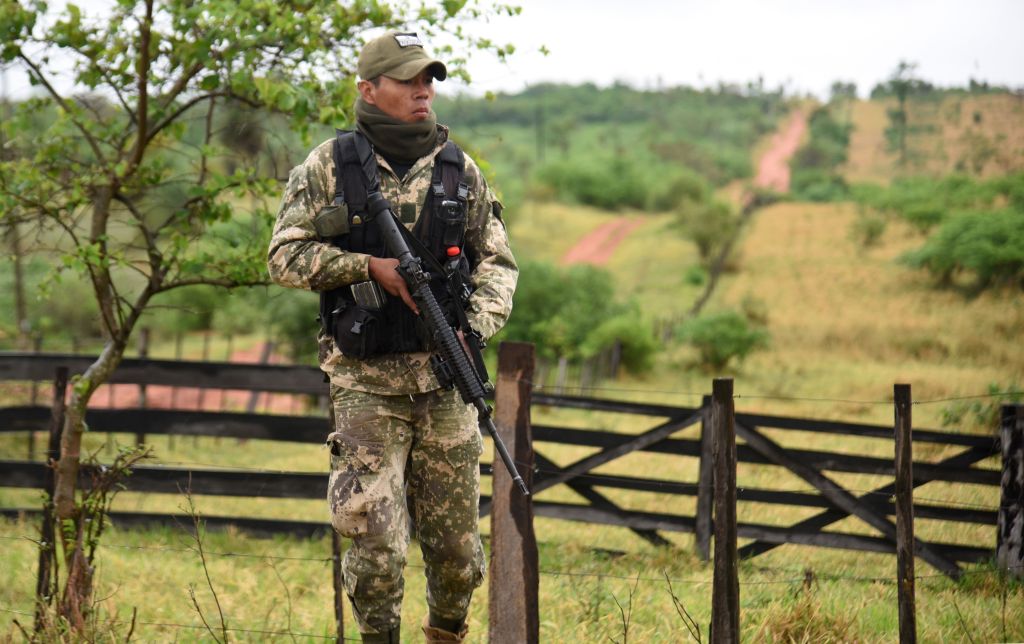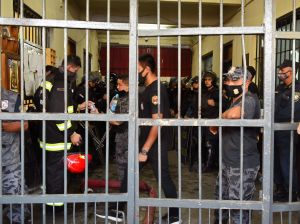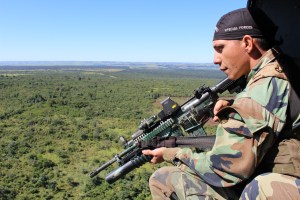Four heavily armed men stormed onto a farm deep in the parched forests of northwestern Paraguay and grabbed the owner’s son, 24-year-old Jorge Ríos Barreto. Then they melted into the darkness, leaving a note: his family had to cough up $200,000 or they would never see their son again.
In a series of voice messages his captors let him send a few days after his abduction in late June, Ríos told his mother, Elisa Barreto, to bring the money. “Stay calm, love, I’ll be there soon, OK?” she can be heard saying in the recording, which the family made public. “OK, mom. They’ve given me two hours,” he replied.
Videos by VICE
But Ríos was found dead on the banks of the river on July 3. He had been shot in the neck.
Rios’ abductors were a tiny far-left group that appears to be gathering strength with a recent volley of kidnappings and attacks. Active in Concepcion, a remote, forested department on Paraguay’s border with Brazil, the group is reportedly responsible for at least eight attacks that have killed Ríos and two other civilians this year.
The group, known as the Armed Peasant Grouping – People’s Army (ACA-EP by its Spanish initials) is believed to consist of just a handful of members. It originated as a splinter group of the Paraguayan People’s Army (EPP), which has been sporadically kidnapping prominent politicians and wealthy landowners in the region since the 2000s.
The EPP sprang back into view in September when it kidnapped the country’s former Vice President, Oscar Denis. Reports put its membership at 20-30 combatants.
It’s unclear to what extent the EPP’s original Marxist ideology has survived in splinter groups such as ACA-EP.
“[The EPP] definitely started out as an ideologically-motivated, Marxist group with sympathies to the [Colombian guerrilla group] FARC,” said Dr Kregg Hetherington, associate professor of anthropology at Concordia University, who has written two books about Paraguay.
The EPP’s founders, Carmen Villalba and Alcides Oviedo Brítez, are in jail, but its attacks have continued. Three soldiers were killed in an ambush on a convoy in San Pedro department on July 29.
In addition to demanding ransom, the EPP have ordered local ranchers to donate goods or livestock to the impoverished local communities. “You can think of that as a bit of a PR stunt, but it definitely conformed with their stated ideology,” Hetherington said.
Armed far-left groups in the region are able to evade capture due to a degree of “tacit support” from local communities, he added, which are neglected by the government and have a history of militant leftwing activism.
The lethal kidnappings have dominated headlines in recent months. But the attention to those crimes has overshadowed the actions of other kinds of organized crime with ties to the country’s ruling elite: The area is a hotbed of drug trafficking, smuggling, and money laundering.
Poor local communities are caught in the crossfire, according to Ramón Corvalan of human rights and nonviolence non-profit, SERPAJ Paraguay, which works in the region.

There is also a long history of land conflict, as local communities resist the spread of vast commercial soybean plantations. The business drives land grabs, promotes the use of toxic agricultural chemicals, and sponsors violent private security forces. Communities have also reported abuse at the hands of state security forces, according to Corvalan.
“The population has to live in the middle of all that,” he said. “The worry that women express is that at schools, for example, at lunch time, there’s like a tacit agreement – people come and speak to the kids and the teachers don’t know if they’re narcos, the EPP, intelligence agents, the security forces… There’s talk of recruitment.”
It’s not uncommon for organized crime, agribusiness, and the country’s ruling class to overlap, Hetherington said. “There’s an elite in north-eastern Paraguay that has always worked with a diversified portfolio where part of it is above-board, such as tobacco farming, and part of it—well, once you’re into tobacco farming, it’s easy to get into tobacco trafficking,” he said.
Former President Horacio Cartes has been implicated in tobacco smuggling and other criminal activity.
The Paraguayan state’s response to the situation has been criticized. In September 2020, the army triumphantly announced that it had killed two “terrorists” in a raid on an EPP encampment. But the supposed rebels were actually two eleven-year-old girls who were visiting family involved with the EPP when the attack happened. The case drew international attention because the children were citizens of neighboring Argentina.
The kidnapping of the former Vice President is thought to be retaliation for that attack. He has not been seen since.
The Inter-American Commission on Human Rights has condemned the killings of the girls and the UN High Commission for Human Rights has demanded that their cases be investigated, along with the disappearance of Villalba and Oviedo’s 14-year-old daughter during a separate raid in December. Paraguay’s Interior Ministry did not respond to requests for comment.
To the many poor families who scratch a living farming Concepcion’s powdery red earth, there’s little choice but to adapt, said Corvalan. “You have to learn to live with it.”







